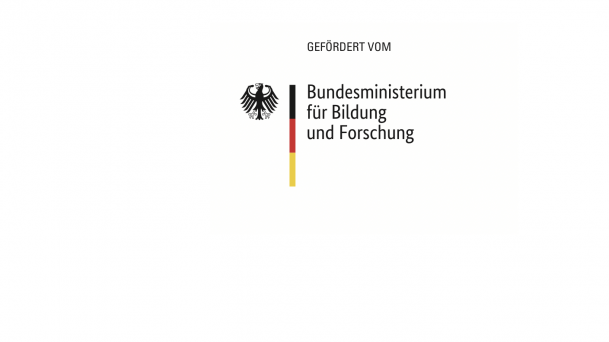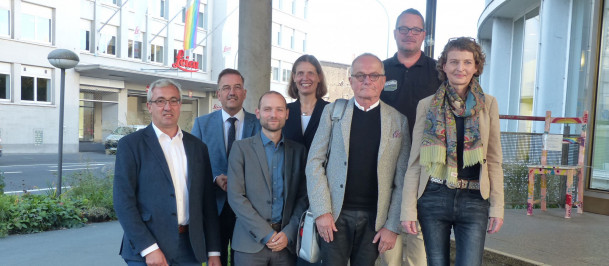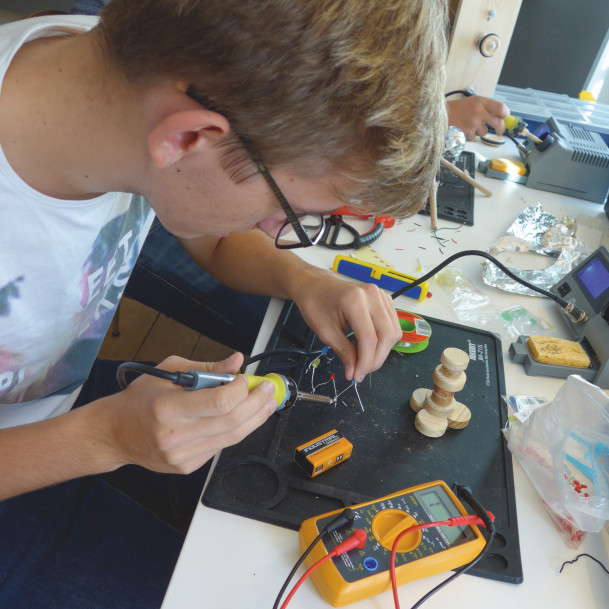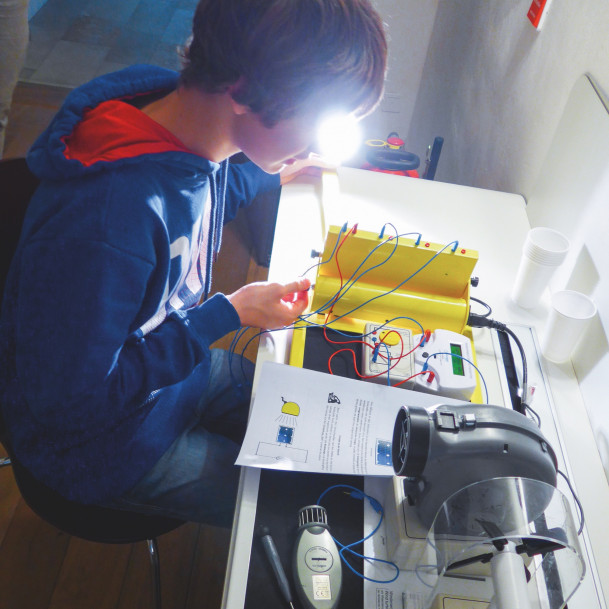MINT CLUSTER WETZLAR
The VISEUM Wetzlar, the Justus-Liebig-University Gießen, and the Office for Economic Development of the city of Wetzlar have teamed up under the umbrella of the STEM promoting MINT CLUSTER WETZLAR (MCW). The cluster is funded by the German Federal Ministry of Education and Research (BMBF).
The future of VISEUM Wetzlar lies ahead in Domhöfe. The relocation is scheduled for summer 2025. Until then, the VISEUM continues to bring forward the STEM education of young people together with partners from the Council for Economic Development and the Justus-Liebig-University Gießen. Their shared goal: Getting young people interested in the subjects mathematics, informatics, natural sciences, and technology (MINT).
The Wetzlar industrial region, which is characterized by highly specialized companies and Hidden Champions, has a great need for skilled staff. This is something that Ralf Niggemann can only confirm: “In every conversation with companies, we get the impression that they all put reducing the shortage of skilled workers above anything else”, he reports. It is a well-known fact that the manager of the Wetzlar Network and chairman of the VISEUM Wetzlar is not someone who buries his head in the sand – quite the contrary: For years he has been working closely together with the companies to assist in actively attracting skilled young talents in the region and for the region with a lasting effect.
Initiative for STEM study programs
The union between VISEUM Wetzlar, Justus-Liebig-University (JLU) Gießen and the Office for Economic Development of the city of Wetzlar (represented by the Wetzlar Network) which forms the STEM promoting MINT CLUSTER WETZLAR (MCW) is another significant step in the right direction. The goal is to get young people interested in the STEM subjects mathematics, informatics, natural sciences, and technology (MINT is the German equivalent to STEM). To that purpose, the German Federal Ministry of Education and Research (BMBF) granted them development funds in the total amount of EUR 469,587 within the framework of their “Funding of Regional Clusters for the STEM education of Young People”. "The commercial relevance of our city is based on its optical, precision mechanical, electrotechnical, and steel processing industries. Therefore, STEM education programs play a particularly important role to us”, Manfred Wagner, Lord Mayor of the city of Wetzlar, points out. “Thanks to the initiative of the partners in the union and the funding by the BMBF, we are able to lead the economic region actively into the future.”
In point of fact, the three partners in the union have all the markings of making it succeed. The MCW will pool the previous STEM activities and refine them cooperatively – by offering specific programs for all age groups. That way, they intend to approach young people and appeal to them in various ways allowing them to discover their individual potential for STEM. On grounds of their different orientation, the partners in the union will be able to increase the involvement of schools and qualified teachers through their existing contacts. In addition to that, the already established network of companies will be used to offer vocational orientation with practical relevance for STEM professions and STEM study programs. “We want to refine and permanently professionalize these services within the network to meet the rising demand for STEM professions in our unique industrial region”, Ralf Niggemann explains.
Orchestrated services and joint activities
The MCW will be located in the VISEUM Wetzlar for organizational and coordinating reasons – but that’s not all: Founded by a network of local industrial enterprises in 2007, the VISEUM Wetzlar has evolved into an important extracurricular learning environment over the course of the last ten years intending to enthuse young people for technology and optics. Here, young people whose interest in STEM subjects and professions has been aroused meet exciting occupational fields. The particular goal is to get young people interested in STEM subjects who don’t necessarily have a penchant for them. In tandem with that, new formats such as “MINT & Art” or “MINT Science & Factory Lab” are devised and implemented. Furthermore, it is designed to better illustrate the possibilities which present themselves in the region when opting for the respective STEM job profiles, says Yvonne Schudy of VISEUM Wetzlar: “Not everybody knows what the companies located here in Wetzlar are doing, and that we have some global market leaders here.”
The Justus-Liebig-University in Gießen, on the other hand, has done a great deal to promote STEM through their department of physics for many years and even developed their own formats for different age groups. These include among other things the pupils’ laboratory “Physics in Action” and the series of lectures “An Eye on Physics”. In a similar way, such activities as the ones offered by the subject area physics at the JLU can also be found in the other natural sciences and in mathematics. Prof. Dr. Claudia von Aufschnaiter of the Institute for Didactics in Physics at the Justus-Liebig-University Gießen explicates: “In the MINT CLUSTER WETZLAR, orchestrated concepts and joint activities enable us to be more deeply involved in and encroach on regional education structures.”
Concept with practical orientation and funding by the BMBF
The network partners complement each other downright perfectly with regards to the substantial and long-lasting subsequent development of their offers and will play an active part in establishing the MINT CLUSTER WETZLAR. Numerous companies have already expressed great interest and assured them of their support as cooperation partners. In addition to that, education providers (Provadis Bildungs- und Beratungs GmbH) as well as pedagogical partners (Integrierte Gesamtschule Solms, Freiherr-vom-Stein-Schule, Goetheschule) will be involved. What matters, says Claudia von Aufschnaiter, is “that the natural sciences are loaded with positive connotations” by making them visible and perceptible. Along these lines, Tobias Klug, physics teacher at the Goetheschule in Wetzlar, wishes for more “reality of life” in imparting STEM competence.
The MCW is expected to provide all of this and will certainly do so. It speaks for the chosen approach that the concept with its practical orientation and the implementation planning for it were able to convince the German Federal Ministry of Education and Research (BMBF). The period of funding covers 36 months beginning in August 2022 and ending before the scheduled relocation of the VISEUM Wetzlar to Domhöfe at the middle of 2025. During this period, the network partners will do the structural and programmatic groundwork which will then be consolidated and continued under the roof of the Science Center Wetzlar from 2025. With that, the MINT CLUSTER WETZLAR will lay the foundation for actively counteracting the permanently acute shortage of skilled young talents – in the region and for the region.
Additional Information:
Contact:
Ralf Niggemann
Manager Wetzlar Network
Chairman of the VISEUM Wetzlar e. V.
info@viseum-wetzlar.de




